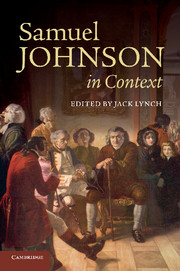Book contents
- Frontmatter
- Contents
- Illustrations
- Contributors
- Preface
- Chronology
- Abbreviations
- Part I Life and works
- Part II Critical fortunes
- Part III Contexts
- Chapter 10 America
- Chapter 11 Anglicanism
- Chapter 12 Anthropology
- Chapter 13 Authorship
- Chapter 14 Biography
- Chapter 15 Book trade
- Chapter 16 Clubs
- Chapter 17 Conversation
- Chapter 18 Dictionaries
- Chapter 19 Domestic life
- Chapter 20 Education
- Chapter 21 Empire
- Chapter 22 Essays
- Chapter 23 Fiction
- Chapter 24 History
- Chapter 25 Journalism
- Chapter 26 Law
- Chapter 27 Literary criticism
- Chapter 28 London
- Chapter 29 Medicine
- Chapter 30 Mental health
- Chapter 31 Money
- Chapter 32 Nationalism
- Chapter 33 Philosophy
- Chapter 34 Poetry
- Chapter 35 Politics
- Chapter 36 Scholarship
- Chapter 37 Science and technology
- Chapter 38 Scotland
- Chapter 39 Sermons
- Chapter 40 Shakespeare
- Chapter 41 Slavery and abolition
- Chapter 42 Social hierarchy
- Chapter 43 Theatre
- Chapter 44 Travel
- Chapter 45 Visual arts
- Chapter 46 War
- Chapter 47 Women writers
- Further reading
- Index
Chapter 11 - Anglicanism
from Part III - Contexts
Published online by Cambridge University Press: 05 June 2012
- Frontmatter
- Contents
- Illustrations
- Contributors
- Preface
- Chronology
- Abbreviations
- Part I Life and works
- Part II Critical fortunes
- Part III Contexts
- Chapter 10 America
- Chapter 11 Anglicanism
- Chapter 12 Anthropology
- Chapter 13 Authorship
- Chapter 14 Biography
- Chapter 15 Book trade
- Chapter 16 Clubs
- Chapter 17 Conversation
- Chapter 18 Dictionaries
- Chapter 19 Domestic life
- Chapter 20 Education
- Chapter 21 Empire
- Chapter 22 Essays
- Chapter 23 Fiction
- Chapter 24 History
- Chapter 25 Journalism
- Chapter 26 Law
- Chapter 27 Literary criticism
- Chapter 28 London
- Chapter 29 Medicine
- Chapter 30 Mental health
- Chapter 31 Money
- Chapter 32 Nationalism
- Chapter 33 Philosophy
- Chapter 34 Poetry
- Chapter 35 Politics
- Chapter 36 Scholarship
- Chapter 37 Science and technology
- Chapter 38 Scotland
- Chapter 39 Sermons
- Chapter 40 Shakespeare
- Chapter 41 Slavery and abolition
- Chapter 42 Social hierarchy
- Chapter 43 Theatre
- Chapter 44 Travel
- Chapter 45 Visual arts
- Chapter 46 War
- Chapter 47 Women writers
- Further reading
- Index
Summary
CHRI′STIAN. n.s. [Christianus, Lat.] A professor of the religion of Christ.
We christians have certainly the best and the holiest, the wisest and most reasonable religion in the world. Tillotson.
Much that we might want to know about religion in the eighteenth century is suggested by Johnson’s seven-word definition of Christian and the choice of his illustrative quotation from the late seventeenth-century Archbishop of Canterbury (the highest authority in the Anglican Church), John Tillotson. Before we look at eighteenth-century Anglicanism more closely, however, it may be helpful to envision a moment to come in the twenty-first century when Jews, Muslims, and Christians all decide they have had their fill of bloody efforts to overwhelm those who do not believe as they do and, laying down their arms, create a brave new world in which we can hold to our own faiths without wanting to punish those who think differently. Perhaps, since we are generating visions, we might even see a world in which religious differences are fully tolerated within every community. Some will mutter on the sidelines that such faith is nominal and lukewarm – some will even label it heretical. Since such mutterers want to lead us back to a renewal of warfare (we might today label this as terrorism and antiterrorism), they will have to be forcefully discouraged, and the power of all countries will have to be solidly engaged in disarming religious conviction (literally and figuratively), finally bringing to all religions the virtues of peace and goodwill. The paradox of our vision, the need to pacify people by brute power, does not escape us.
Religious centrism
Christianity is a religion built on mysteries and paradoxes, but the one that most concerned the eighteenth century has been fundamental to the faith since its Gospel beginnings: insisting on the Truth of God is in direct conflict with the message of peace professed by Jesus. Even without the New Testament injunction to spread the Word, the very nature of knowing the Truth seems to entail, as Jonathan Swift astutely argued in the most brilliant of all eighteenth-century satires, A Tale of a Tub (1704), the desire to impart it to others – in a friendly way if possible, forcibly if necessary.
- Type
- Chapter
- Information
- Samuel Johnson in Context , pp. 101 - 108Publisher: Cambridge University PressPrint publication year: 2011
- 1
- Cited by



